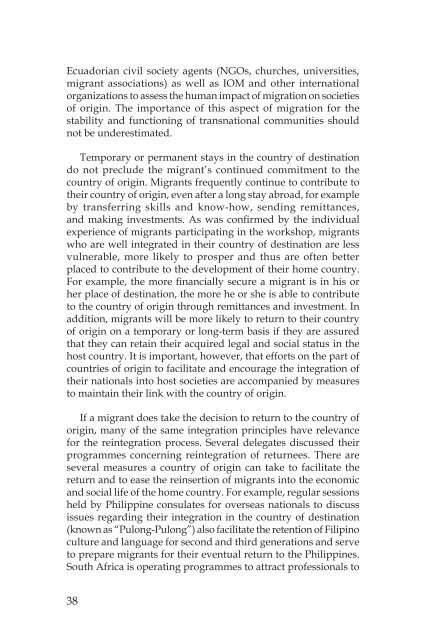Link - IOM Publications - International Organization for Migration
Link - IOM Publications - International Organization for Migration
Link - IOM Publications - International Organization for Migration
You also want an ePaper? Increase the reach of your titles
YUMPU automatically turns print PDFs into web optimized ePapers that Google loves.
Ecuadorian civil society agents (NGOs, churches, universities,<br />
migrant associations) as well as <strong>IOM</strong> and other international<br />
organizations to assess the human impact of migration on societies<br />
of origin. The importance of this aspect of migration <strong>for</strong> the<br />
stability and functioning of transnational communities should<br />
not be underestimated.<br />
Temporary or permanent stays in the country of destination<br />
do not preclude the migrant’s continued commitment to the<br />
country of origin. Migrants frequently continue to contribute to<br />
their country of origin, even after a long stay abroad, <strong>for</strong> example<br />
by transferring skills and know-how, sending remittances,<br />
and making investments. As was confirmed by the individual<br />
experience of migrants participating in the workshop, migrants<br />
who are well integrated in their country of destination are less<br />
vulnerable, more likely to prosper and thus are often better<br />
placed to contribute to the development of their home country.<br />
For example, the more financially secure a migrant is in his or<br />
her place of destination, the more he or she is able to contribute<br />
to the country of origin through remittances and investment. In<br />
addition, migrants will be more likely to return to their country<br />
of origin on a temporary or long-term basis if they are assured<br />
that they can retain their acquired legal and social status in the<br />
host country. It is important, however, that ef<strong>for</strong>ts on the part of<br />
countries of origin to facilitate and encourage the integration of<br />
their nationals into host societies are accompanied by measures<br />
to maintain their link with the country of origin.<br />
If a migrant does take the decision to return to the country of<br />
origin, many of the same integration principles have relevance<br />
<strong>for</strong> the reintegration process. Several delegates discussed their<br />
programmes concerning reintegration of returnees. There are<br />
several measures a country of origin can take to facilitate the<br />
return and to ease the reinsertion of migrants into the economic<br />
and social life of the home country. For example, regular sessions<br />
held by Philippine consulates <strong>for</strong> overseas nationals to discuss<br />
issues regarding their integration in the country of destination<br />
(known as “Pulong-Pulong”) also facilitate the retention of Filipino<br />
culture and language <strong>for</strong> second and third generations and serve<br />
to prepare migrants <strong>for</strong> their eventual return to the Philippines.<br />
South Africa is operating programmes to attract professionals to<br />
8

















